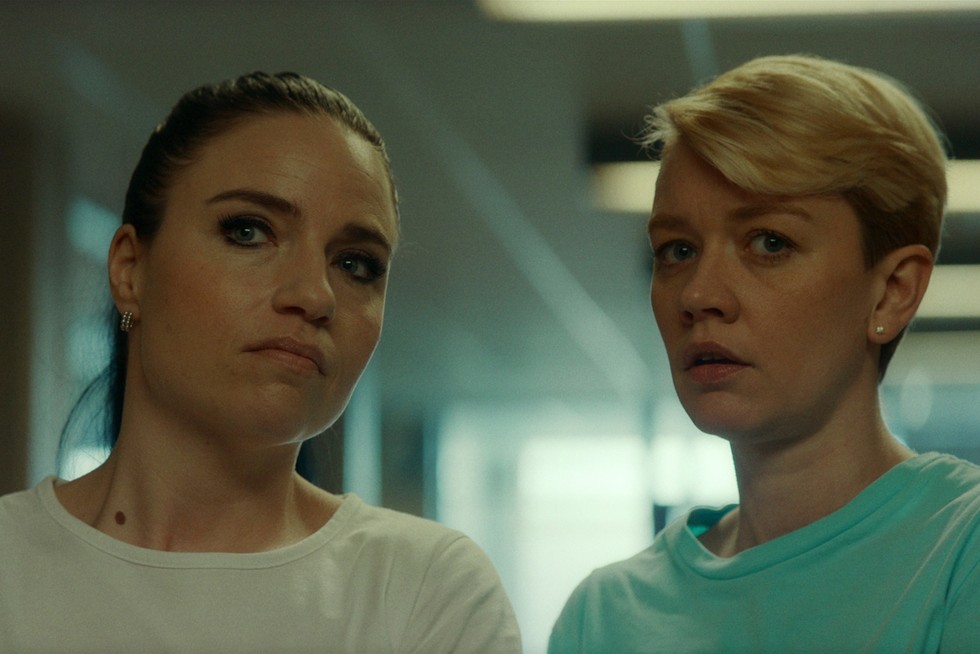
The Nurse
A decent dramatization of a horrendous true story by Kasper Barfoed.
Anyone wishing to identify the thematical trends in film and television productions that picked up steam during the last decade and continue to attract an ever-increasing part of the global audiences, will certainly won't fail to miss the ascent of true crime works internationally. These movies and TV shows focus on delivering a fictional retelling of criminal cases that shook all sensible human beings to the core in the past. Kasper Barfoed's The Nurse picks up the mantle from Tobias Lindholm's The Good Nurse, starring Eddie Redmayne and Jessica Chastain -a show also aired by Netflix- as the two productions share some fundamental similarities in regards to the actual story they want to convey. Both Lindholm and Barfoed chose to shine a light on 2 cases of fatal medical malpractice, the first in the United States and the second in Denmark. The culprits of the heinous crimes, Charlie Cullen and Christina Aistrup Hansen respectively, took advantage of their professional position, poisoning several of their patients whose cause of death was ruled as drug overdose in the vast majority of the cases. Even though Cullen murdered more people than Hansen, both cases raised some critical questions concerning how are we to trust the medical system when it can't wash itself clean of severely disturbed doctors and nurses, how much power modern medicine holds over us, and how vulnerable we truly are when we get sick and need care.
Barfoed (Chestnut Man, Trom), who, apart from creator of the series, is also the director and screenwriter, is the mastermind of this -almost- solo project that left me with a bag of mixed feelings, feeling indecisive in respect to my final assessment of the show as a whole. While the production, undoubtedly, has many merits such as the leading actors' performances and the clinical, cold cinematography, it is not concerned at all with the police investigation part and the subsequent trial and sentencing of Hansen (which took place in 2017) with the narrative center consisting of the two protagonists', nurses Pernille Kurzmann Larsen (Fanny Louise Bernth) and Christina Hansen (Josephine Park), relationship dynamic and Pernille's strife to convince those around her that something is evidently wrong in the hospital, most of all her colleagues who are refusing to believe the outrageous accusations, some due to plain idiocy and others because of believing in a twisted sense of professional solidarity that forbids them to denounce one of their own regardless of their -criminal- actions. The story is narrated in the course of 4 parts (45-50 minutes each) and the limited number of episodes is complemented by a tight scenario, not without its flaws as we will see in the following paragraphs, ending with Pernille finally getting some hard evidence that confirms her suspicions regarding Christina. Thus, the show ends before the beginning of the police investigation into the matter that began in March 2015.
The show begins with Pernille getting ready to start a new job at the Nykøbing Falster Hospital, something that causes a certain amount of stress to the protagonist who is, moreover, the single mom of an eight-year-old girl, Alberte (Selma Kjær Kuscu). As she gets acquainted with the new, rather miserable, working environment, Pernille strikes a friendship with the seasoned nurse Christina who is also the mom of a little girl herself. The two women will form a bond and the first episode of the show patiently paves the way for the main narrative to unravel, introducing the main characters to the audience and also setting the tone that marks the production's atmosphere. We witness the first interactions between the two protagonists and throughout the show, we get a chance to watch their friendship crumbling under the strain of Christina's crimes and Pernille's suspicions. The following 3 episodes tell Pernille's story, embracing her perspective of the plot's events, and her quest for vindication and justice. The pacing is rather slow, though, as I already mentioned above, the focus remains solely on the characters, the tension between them and the emotions inciting them to action.
The direction is the work of a true expert and Barfoed proves, once again and after several successful works, such as the recent Trom starring Ulrich Thomsen as a father looking for his unknown daughter in the faraway Faeroe Islands and, of course, the more than well-received Chestnut Man, he seems to have reached at the peak of his directorial maturity. In Hollywoodgossip.co.in, we read: "The panning shots, frantic cuts, and transitions paired with the perfect sounds, from thuds to sirens, all on the beat, create an ominous environment akin to impending doom". In terms of acting, Josephine Park, known for her involvement in productions such as When the Dust Settles and The Rain, steals the thunder from Fanny Louise Bernth who, nevertheless, does a fine job in her portrayal of Pernille, a woman struggling to be heard and who is facing major emotional challenges that seep into her face and shape her expressions. On the negative side, I have to say that the back-and-forth in time could be handled better and, at times, I felt that the past timeline had nothing substantial to offer in the core storyline. Plus, the creator resolved to provide some relief to the audience from the grim subject of the show by moments which are meant to be humorous, but fail to acquire an integral part in the narrative, eventually feeling like being out of tune with the general tone.
For those who would like to know more about the real case of Christina Aistrup Hansen, you can read the book written by Kristian Corfixen (The Nurse: The True Story Behind One of Scandinavia's Most Notorious Criminal Trials), a Danish journalist who did his due diligence, drawing information from various sources regarding the case and examining autopsy reports, medical records, private correspondence, and testimony from key witnesses.
About
Sjuksköterskan